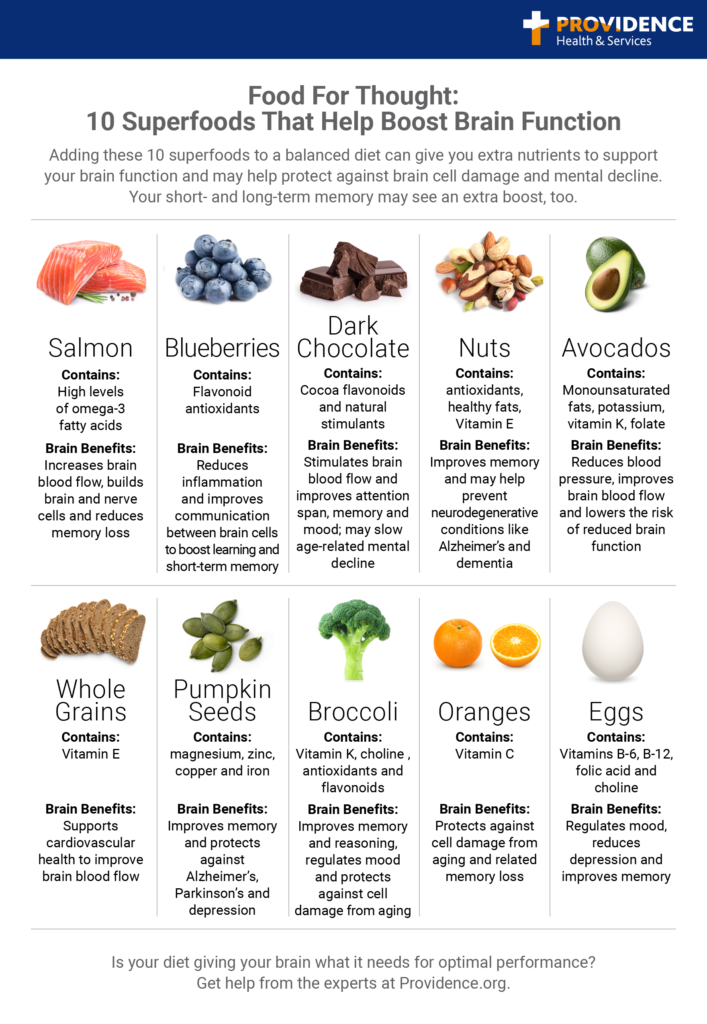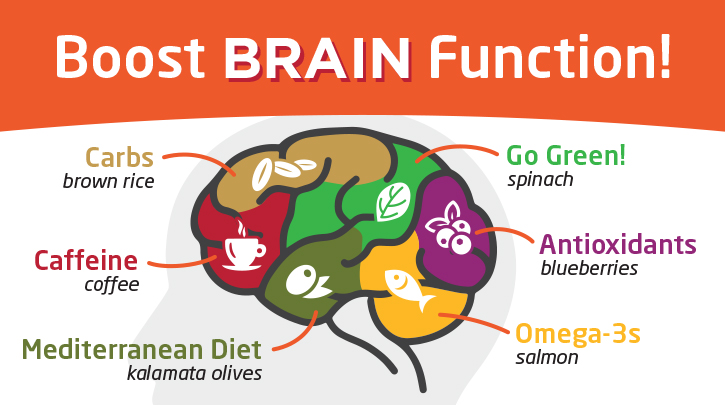What are the Foods that Increase Your Brain Power?
In our fast-paced world, where mental clarity and focus are highly valued, the quest for optimal brain health and performance is more critical than ever. While a healthy lifestyle, including regular exercise and adequate sleep, plays a crucial role in brain function, the food we consume also significantly impacts our cognitive abilities. Scientists have discovered that certain foods, brain-boosting or innovative supplements, can enhance brain health and support mental sharpness.
This article will explore the power of brain-boosting foods and their potential to improve cognitive function. We will delve into the science behind these foods, understand how they benefit the brain, and provide practical tips on incorporating them into your daily diet. Additionally, we will introduce an intelligent supplement called Artvigil 150, which can further enhance cognitive performance and support brain health.

Understanding Brain Health
The Gut-Brain Connection
The connection between the gut and the brain is a topic of growing interest in the field of neuroscience. Scientists have found that the gut and the brain communicate bidirectionally through a complex network of nerves, hormones, and biochemical signals. This means that the health of our gut can directly impact our brain function.
When we consume whole, nutritious foods, we nourish our bodies and support our brains’ well-being. On the other hand, a poor-quality diet can lead to inflammation in the body, ultimately damaging the brain and contributing to cognitive decline.
The Impact of Diet on Mental Health
Our diet plays a crucial role in maintaining optimal mental health. Certain nutrients, such as antioxidants, healthy fats, vitamins, and minerals, are essential for brain function. These nutrients provide energy to the brain, protect brain cells from damage, and support cognitive processes such as memory and concentration.
Conversely, a diet high in inflammatory foods can increase the release of inflammatory cytokines in the body, which have been linked to various mental and cognitive conditions, including dementia and Alzheimer’s disease.
As we age, maintaining a sharp and focused mind becomes increasingly essential. While no magic pill prevents cognitive decline, research suggests that adopting a healthy dietary pattern can significantly contribute to brain health. This comprehensive guide will explore the top foods that boost brain power and promote cognitive function. By incorporating these foods into your diet, you can take proactive steps toward preserving your brain health as you age.
Green, Leafy Vegetables: Nature’s Brain Boosters
One of the best ways to nourish your brain is by consuming various green, leafy vegetables. Vegetables like kale, spinach, collards, and broccoli are packed with essential nutrients that support brain health. These leafy greens are rich in vitamin K, lutein, folate, and beta-carotene, all linked to improved cognitive function and a decreased risk of cognitive decline.
Incorporating leafy greens into your diet is easy and can be done in various ways. You can enjoy them in salads, sauté them as a side dish, or blend them into smoothies for a quick and nutritious snack. Experiment with different recipes and cooking methods to find what suits your taste buds best.
Fatty Fish: Omega-3 Powerhouses
Fatty fish, such as salmon, cod, canned light tuna, and pollack, are excellent sources of omega-3 fatty acids. These healthy unsaturated fats have been extensively studied for their positive impact on brain health. Omega-3 fatty acids have been linked to lower levels of beta-amyloid, a protein associated with the formation of damaging clumps in the brains of individuals with Alzheimer’s disease.
To reap the benefits of omega-3 fatty acids:
- Aim to incorporate fatty fish into your diet at least twice a week.
- If you’re not a fan of fish, consider alternatives such as flaxseeds, avocados, and walnuts, which are also rich in omega-3 fatty acids.
- Consult with your doctor about taking an omega-3 supplement to ensure you meet your body’s needs.
Berries: A Colorful Boost for Your Brain
Not only are berries delicious, but they are also packed with brain-boosting properties. The natural plant pigments in berries, called flavonoids, have improved memory and cognitive function. A study conducted by researchers at Harvard’s Brigham and Women’s Hospital discovered that women who consumed two or more servings of strawberries and blueberries each week experienced a delay in memory decline by up to two-and-a-half years.
To incorporate more berries into your diet, consider adding them to your breakfast cereal, blending them into smoothies, or enjoying them as a refreshing snack. The vibrant colors and sweet flavors of berries make them a delightful addition to any meal or snack.
Tea and Coffee: A Stimulating Cup of Mental Clarity
The caffeine found in tea and coffee can offer more than just a temporary boost of concentration. Research suggests that caffeine consumption positively impacts mental function and memory. A study published in The Journal of Nutrition found that individuals with higher caffeine intake scored better on cognitive function tests. Caffeine may also aid in solidifying new memories, as indicated by another study conducted at Johns Hopkins University.
If you enjoy a warm cup of tea or coffee in the morning, you’re already on the right track. However, consuming these beverages in moderation is essential, as excessive caffeine intake can lead to adverse side effects. Aim to strike a balance and enjoy the benefits of caffeine without overdoing it.
Walnuts: The Nutty Superfood for Brain Health
Nuts, in general, are excellent sources of protein and healthy fats, but walnuts stand out when it comes to brain health. A study by UCLA found that higher walnut consumption was associated with improved cognitive test scores. Walnuts are rich in alpha-linolenic acid (ALA), a type of omega-3 fatty acid that has been linked to lower blood pressure and cleaner arteries.
To incorporate walnuts into your diet, consider adding them to salads, oatmeal, or yogurt. You can also enjoy them as a standalone snack or substitute for other nuts in baking recipes. With their crunchy texture and nutty flavor, walnuts make a versatile and nutritious addition to any meal.
Dark Chocolate: A Sweet Treat for Your Brain
Good news for chocolate lovers! Dark chocolate, in moderation, can provide a range of health benefits, including improved brain function. Dark chocolate contains flavonoids, similar to those found in berries, which have been shown to enhance memory and cognitive abilities.
When indulging in dark chocolate, opt for varieties with a high cocoa content, as they contain the most flavonoids. Additionally, be mindful of portion sizes, as chocolate is high in calories. Enjoy a small piece of dark chocolate as a treat, or incorporate it into recipes that call for a touch of sweetness.
Turmeric: A Spice with Brain-Boosting Benefits
Turmeric, a vibrant yellow spice commonly used in curry dishes, contains curcumin. Curcumin has powerful antioxidant and anti-inflammatory properties, which have been linked to improved brain health and a reduced risk of cognitive decline.
Incorporating turmeric into your diet can be as simple as adding it to your favorite recipes. Sprinkle it on roasted vegetables, stir it into soups, or use it as a seasoning for meat and fish dishes. You can also enjoy a warm cup of turmeric tea for more brain-boosting benefits.
Pumpkin Seeds: Tiny Powerhouses of Nutrients
Pumpkin seeds may be tiny, but they pack a nutritional punch. These small seeds are a rich source of magnesium, iron, zinc, and copper, all essential for brain health. Magnesium, in particular, plays a crucial role in learning and memory.
To incorporate pumpkin seeds into your diet, sprinkle them on salads, yogurt, or oatmeal. You can also roast them for a crispy and nutritious snack. With their mild and nutty flavor, pumpkin seeds add a delightful crunch to various dishes.
Oranges: The Vitamin C Boost Your Brain Needs
Oranges are refreshing and delicious and provide a significant dose of vitamin C. Vitamin C is an antioxidant that helps protect brain cells from oxidative stress and supports the production of neurotransmitters. Adequate vitamin C intake has been associated with a reduced risk of cognitive decline and improved mental agility.
To enjoy the brain-boosting benefits of oranges, incorporate them into your daily routine. Enjoy freshly squeezed orange juice, add orange slices to salads, or snack on this juicy fruit. The natural sweetness and tangy flavor of oranges make them a perfect addition to any meal or snack.
Whole Grains: Fuel for Your Brain
Eating whole grains, such as brown rice, quinoa, oats, and whole wheat bread, provides a steady energy supply for your brain. These complex carbohydrates are digested slowly, ensuring a constant release of glucose, which is the primary fuel for the brain.
Make a conscious effort to incorporate whole grains into your meals by opting for complete grain versions of your favorite foods. Swap white bread for whole wheat bread, choose brown rice over white rice, and experiment with different full-grain recipes. These simple swaps give your brain the sustained energy it needs for optimal functioning.

Artvigil 150: A Tool for Cognitive Enhancement
Artvigil 150 is not a magic pill that can instantly make you smarter or replace healthy lifestyle habits. Artvigil 150 is a prescription medication that belongs to a class of drugs known as eugeroics. It is primarily used to treat sleep disorders such as narcolepsy, sleep apnea, and shift work sleep disorder. However, its cognitive-enhancing properties have attracted attention from individuals seeking to improve their mental performance.
Artvigil pill contains the active ingredient armodafinil, which is a more potent form of modafinil. In the quest for enhanced cognitive function and increased wakefulness, the debate between Modafinil and Armodafinil often takes center stage. Modafinil is a well-known nootropic drug that has been extensively studied for its cognitive-enhancing effects. Armodafinil, the primary component of Artvigil 150, is believed to provide a more sustained and focused boost to brain function.
However, when used responsibly and with a balanced diet, regular exercise, and good sleep hygiene, it can be a valuable tool for unlocking your brain’s full potential.
It is important to note that Artvigil should not be used as a substitute for adequate sleep. While it can help improve wakefulness, it is still essential to prioritize quality sleep for optimal brain health.
How Artvigil Works
The exact mechanism of Artvigil’s action has yet to be fully understood. However, it is believed to work by increasing the release of neurotransmitters in the brain, such as dopamine, norepinephrine, and histamine. These neurotransmitters are crucial in regulating wakefulness, attention, and cognitive function.
Artvigil 150 also works by inhibiting the reuptake of these neurotransmitters, allowing them to remain active in the brain for extended periods. This increases mental clarity, improves focus, and enhances cognitive abilities.
The Benefits of Artvigil for Brain Health
Improved Wakefulness and Alertness: Artvigil promotes wakefulness, making it an effective tool for combating excessive sleepiness and fatigue. Keeping you alert and focused allows for better productivity and mental performance.
Enhanced Cognitive Function: Artvigil 150 has improved various aspects of cognitive function, including memory, attention, and executive function. It can help individuals think more clearly, process information faster, and make better decisions.
Increased Motivation and Drive: Artvigil 150 can boost motivation and drive, making staying focused on tasks and goals easier. It can help individuals overcome procrastination and maintain a high level of productivity.
Reduced Brain Fog: Many people experience brain fog, a lack of mental clarity, and difficulty concentrating. Artvigil 150 can help alleviate brain fog, allowing for clearer thinking and improved cognitive performance.
Neuroprotective Effects: Artvigil has been found to have neuroprotective properties, meaning it can help protect the brain from damage and degeneration. It may help prevent age-related cognitive decline and reduce the risk of neurodegenerative diseases such as Alzheimer’s and Parkinson’s.

Safe Usage and Dosage
Artvigil 150 should only be taken under the supervision of a healthcare professional. Following the prescribed dosage and staying within the recommended amount is essential. The standard dosage for Artvigil 150 is 150 mg daily, taken in the morning.
Taking Artvigil 150 on an empty stomach is advisable to ensure optimal absorption and effectiveness. Avoid consuming alcohol or other substances that may interact negatively with the medication.
Potential Side Effects
Like any medication, Artvigil 150 may cause side effects in some individuals. Common side effects include headache, nausea, dizziness, and insomnia. These side effects are usually mild and temporary, but it is essential to consult a healthcare professional if they persist or worsen.
Serious side effects are rare but can occur. These may include allergic reactions, chest pain, rapid heartbeat, and mood changes. If you experience severe or concerning side effects, seek immediate medical attention.
The Final Thought
Artvigil 150 is a powerful cognitive enhancer that can improve wakefulness, enhance cognitive function, and protect the brain from age-related decline. Its ability to boost motivation, increase focus, and reduce brain fog has become a sought-after tool for those looking to optimize their mental performance.
However, it is crucial to use Artvigil 150 responsibly and under the guidance of a healthcare professional. It is unsuitable for everyone, and its usage should be carefully monitored to ensure safety and effectiveness.
If you are interested in exploring the benefits of Artvigil 150, consult with your healthcare provider to determine if it is the right choice for you. With proper usage and a holistic approach to brain health, Artvigil 150 can be valuable in unlocking your brain’s potential.




